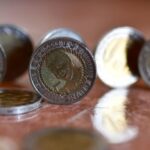Rather than rely on your nearest auction house, it’s a good idea to find one which specialises in coins because they’ll have a more detailed understanding of the numismatic market and a customer base which is likely to pay a premium.
At Warwick & Warwick, we have an extensive database of coin collectors and dealers from all over the UK, Europe and around the world. We can use our skills and experience to advise you whether to sell a coin collection intact or break it down into parts in order to ensure the maximum possible realisation.
Step 2 – Get an expert valuation
If you’re considering selling coins at auction, it’s important to be well advised at every step – but none more so than the valuation stage. Always get your items appraised by an experienced expert, who should be willing to advise you about their value (in writing) for free. At no point should you be under any obligation to sell.
All of the coin valuations we conduct at Warwick & Warwick are carried out in this manner in our offices, where we can refer to a library of technical books, previous sale catalogues and a database of information concerning recent realisations and sale prices.
Step 3 – Decide whether to sell or not?
Once you’ve received a valuation, it’s time to decide whether to sell your coins or not. You may end up deciding that you want to keep your items. Take your time to decide and, whatever the outcome may be, don’t be swayed by the persuasive nature of a valuer, dealer or auctioneer.
At Warwick & Warwick, we believe our role is to present you with as much evidence as possible so that you can make your own informed decision. If you do decide to press ahead with an auction sale, we will execute your wishes as effectively and efficiently as possible. However, if we believe a Private Treaty Sale is in your best interests or better suited to your specific type of collection, we may recommend this method instead of an auction. Ultimately, though, the final decision should always be yours.
Step 4 – Set a reserve
If you choose to proceed with a sale at auction, you’ll need to decide whether to place a ‘reserve’ on your items – the minimum amount you’re willing to accept.
At Warwick & Warwick we are valuers and auctioneers, so our experts can use their extensive up-to-date knowledge to recommend a reserve which is reflective of current market trends – ensuring your coins are not knowingly under-sold.
Step 5 – Describe and market your coins
Although this is probably the most important part of the auction process, there’s no need to actually do it yourself – a specialist auction house will do it for you, using relevant numismatic terms to attract the highest possible interest. If you consign items for sale at Warwick & Warwick, our experts will take care of this on your behalf.
Step 6 – Enjoy the sale day
If decide to sell items in a coin auction, you’re obviously welcome to go along and enjoy the salesroom experience but you don’t have to attend if you don’t want to. At Warwick & Warwick, auction realisations are normally available online on the evening after the sale.
Step 7 – Get your money
Settlement is normally made 30 days after the date of sale and will reflect the hammer price less commission. At Warwick & Warwick, our total deduction is 21% of the hammer price – a 17.5% commission plus VAT on auction lots reserved at no more than 60% of estimate. These are deducted from the final settlement, which is paid by cheque in sterling. Even after commissions are deducted, it’s normally possible to get a better return by selling coins at auction because you’re closer to the retail price.






